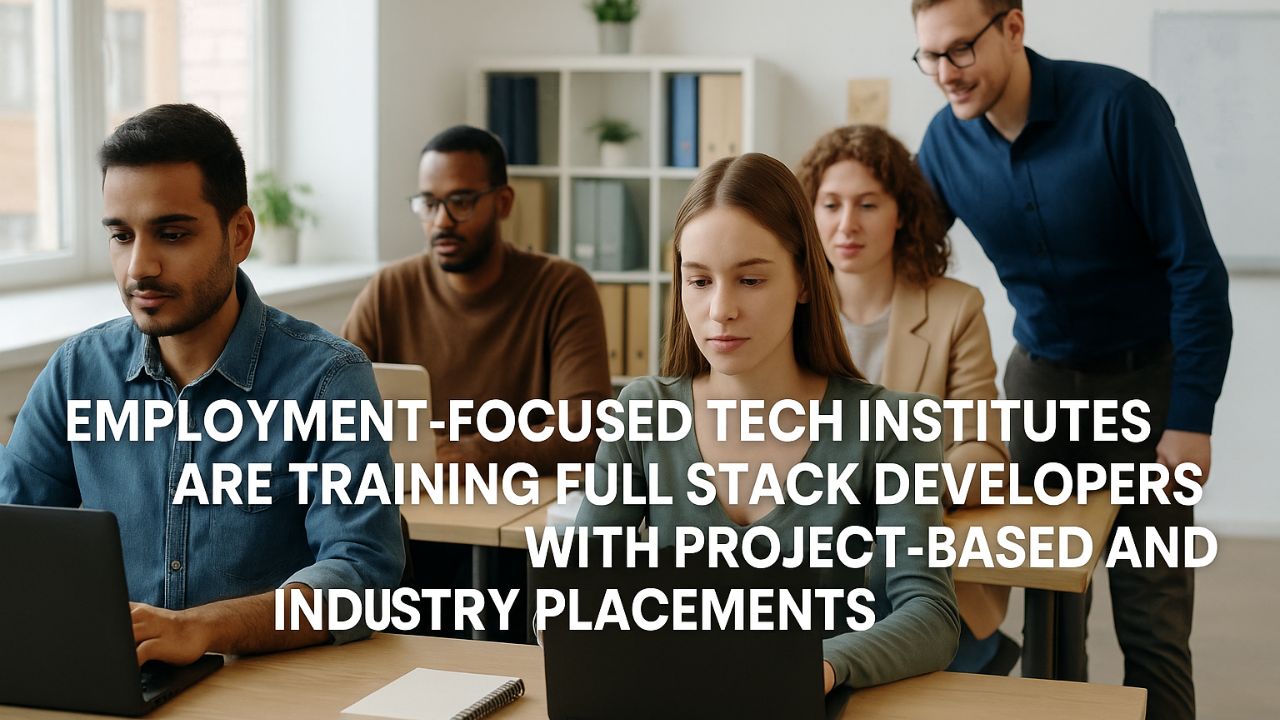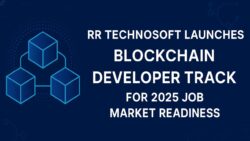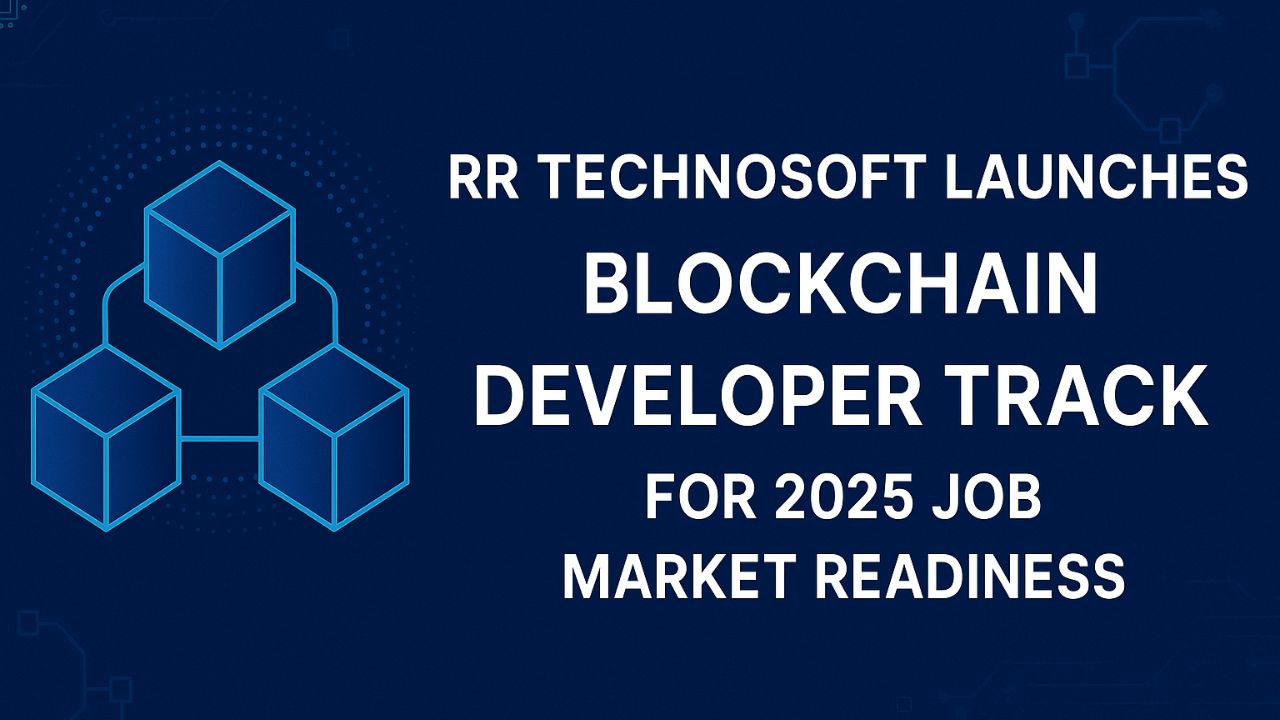Project-Based Learning and Industry Placements – In today’s rapidly evolving digital economy, the demand for skilled full stack developers is growing exponentially. With startups, mid-sized companies, and large enterprises all undergoing digital transformation, full stack development skills are no longer just valuable—they’re essential. Recognizing this opportunity, several employment-focused tech institutes across India and globally have revamped their curriculum to center around project-based learning and industry-integrated placements. These institutes aren’t just offering courses—they’re building careers. In this article, we’ll explore how these tech institutes are training full stack developers using real-world projects, hands-on mentorship, and corporate partnerships that ensure job placements. We’ll also look at success stories, curriculum features, and how students from non-tech backgrounds are now landing jobs at top firms like Infosys, Wipro, and TCS.
Why Full Stack Development Is in High Demand
Full stack developers are versatile tech professionals capable of handling both front-end and back-end development. This unique ability makes them valuable to employers seeking cost-effective and agile development teams.
- Companies are looking for multi-skilled coders to reduce dependency on separate front-end/back-end teams.
- Startups prefer full stack developers to build MVPs quickly and scale fast.
- Digital transformation in sectors like healthcare, fintech, and e-commerce fuels the demand.
Key Features of Employment-Focused Tech Institutes
These institutes go beyond traditional classroom teaching and focus on creating industry-ready developers.
Highlights of Their Programs:
- Project-Based Learning: Students work on real-world projects from Day 1.
- Live Industry Exposure: Regular sessions with tech mentors from leading firms.
- Placement Guarantee: Some institutes offer job assurance or money-back guarantees.
- Flexible Learning: Weekend or online classes for working professionals and students
-

Employment-Focused Tech Institutes .
Top Tech Institutes Leading the Way
Here’s a comparative table of leading institutes offering full stack development programs:
| Institute Name | Course Duration | Fee Range | Placement Guarantee | Mode of Learning | Top Hiring Partners |
|---|---|---|---|---|---|
| Masai School | 30 weeks | ₹3.15 – ₹3.5 Lakh | Yes (ISA model) | Online & Hybrid | Paytm, Ola, Capgemini |
| Newton School | 6 – 12 months | ₹2.5 – ₹3 Lakh | Yes | Online | Zomato, ThoughtWorks |
| Scaler Academy | 9 – 12 months | ₹3 – ₹4.5 Lakh | Yes | Online | Razorpay, Google, Amazon |
| FunctionUp | 16 weeks | ₹0 upfront (ISA) | Yes | Online | Unacademy, Swiggy, Cred |
| GUVI (by IITM) | 3 – 6 months | ₹60K – ₹90K | Depends on course | Online | Zoho, Freshworks |
How Project-Based Learning Enhances Real-World Skills
Project-based learning is at the heart of these programs. Unlike conventional academic courses, learners here solve real tech problems.
Key Benefits:
- Build a portfolio with live applications (e.g., e-commerce site, chat apps).
- Learn teamwork, Git, API integration, and deployment.
- Understand client requirements and agile methodology.
Example: A learner at Masai built a full-fledged job portal during the 24th week of training, later securing a job with CTC ₹7.2 LPA.

Industry-Integrated Placement Support
Tech institutes maintain partnerships with 200+ companies to ensure smooth placement pipelines.
Components of Placement Support:
- Mock Interviews: With former tech leads from Google and Amazon.
- Resume Building Workshops: Tailored to full stack roles.
- Soft Skill Training: Communication, presentation, and teamwork.
- Demo Days: Students showcase final projects to recruiters.
| Placement Element | Description |
|---|---|
| 1-on-1 Mentorship | Regular guidance from industry experts |
| Job Portal Access | Internal listings with hiring companies |
| HR Round Preparation | Mock calls and psychometric tests |
| Internship to Full-time | Most internships convert within 3 months |
Who Can Join These Courses?
These full stack programs are designed for maximum inclusivity and accessibility.
Ideal Candidates:
- Graduates from any stream (B.A, B.Com, B.Sc., etc.)
- Working professionals looking to switch careers
- Freshers from Tier-2 and Tier-3 colleges
- Women re-entering the workforce after a break
Many students from non-coding backgrounds have landed ₹6–10 LPA jobs after 6–12 months of rigorous training.
Fee Models and Affordability
Affordability is a key factor why these institutes have grown in popularity.
Common Models:
- Income Share Agreement (ISA): Pay only after getting a job.
- No-Cost EMI: Monthly plans with zero interest.
- Placement-Linked Payment: Pay partial fees post-placement.
Example Table:
| Institute | Payment Model | Refund Policy |
|---|---|---|
| Masai School | ISA (15% of salary) | 100% refund if no job |
| FunctionUp | ISA – 17% up to 36 months | No fee if not placed |
| GUVI | Upfront & EMI options | Limited refund |
Real Success Stories from Learners
Several alumni have shared their journeys from zero coding knowledge to becoming backend engineers or full stack developers in top firms.
Notable Examples:
- Ritika, a BA graduate from Jaipur, joined Newton School and landed a ₹9.5 LPA package at Zomato.
- Arvind, a college dropout, is now working as a developer at Cred after completing FunctionUp’s bootcamp.
- Nisha, a mother of two from Lucknow, became a frontend engineer at Zoho after training with GUVI.
These stories are testimony to how project-based, placement-driven education can transform lives.
How to Enroll and Start Learning
Getting started is easier than ever. Most institutes offer free trials or entrance tests.
Steps to Begin:
- Visit the official website of the chosen institute.
- Sign up for a free career counseling or attend a demo session.
- Clear the entrance test (aptitude + logic + communication).
- Select your course batch and finalize the payment model.
- Start your learning journey with a dedicated mentor.
FAQs
Q1. Do I need prior coding experience to enroll in a full stack program?
No. Most programs start from the basics and are designed for beginners.
Q2. How much salary can I expect after completing such a course?
Entry-level salaries range from ₹4–₹10 LPA depending on your performance and the hiring company.
Q3. Are these institutes better than traditional computer science degrees?
They offer faster, job-focused training. Ideal for those looking for employment within a year.
Q4. What tech stacks are taught in these courses?
Popular stacks include MERN (MongoDB, Express, React, Node), HTML/CSS, JavaScript, and some teach Python, Django as well.
Q5. Can I switch careers from a non-tech field using these bootcamps?
Yes, many learners come from non-tech backgrounds like B.Com, BBA, or arts and successfully become developers.






